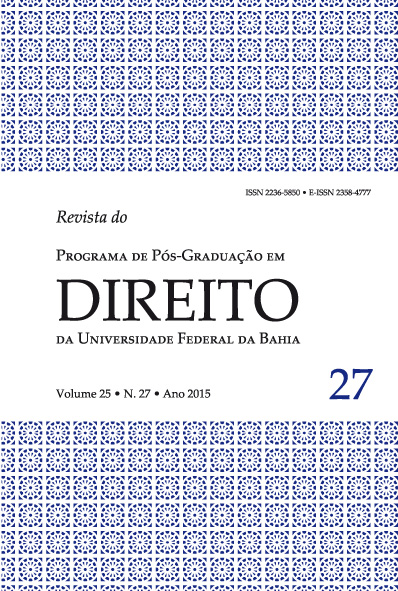Ativismo judicial: o supremo tribunal federal fazendo escola e como nem sempre devemos seguir o mestre / Judicial Activism : The Federal Supreme Court making school and how we should not always follow the master
DOI:
https://doi.org/10.9771/rppgd.v25i27.15202Abstract
The aim of the present work is to demonstrate how judges
are being protagonists of antidemocratic judgments, in order to include
situations which, in theory, the legal text would not contain,
exceeding the normative scope of the text. Thus, it is about a study
that projects itself for better control of judicial decisions, so that they
are not issued on a discretionary way. Therefore, it was sought to basis
in the doctrine to identify the reasons that led the Brazilian judges to
act in an activist way. In this sense, it is initially made a possible differentiation
between judicial activism and legalization and the benefits
or harms of such conducts. It was also sought trough recent judicial
decisions to demonstrate by sampling that these decisions considered
activists do not respect the semantic limits of a text and its interpretation
, decisions of this kind that are increasingly proliferating by the
judiciary , which creates legal uncertainty due the instability caused
by the lack of legal test when the judge renders his decision. Finally,
conclusions were presented in order of which may be the limits of
interpretation of a text and how extrapolating these limits may damage
democracy.
Downloads
Downloads
Published
How to Cite
Issue
Section
License
1. Autores mantém os direitos autorais e concedem à revista o direito de primeira publicação, com o trabalho simultaneamente licenciado sob a Licença Creative Commons Atribuição 4.0 Internacional que permite o compartilhamentodo trabalho com reconhecimento da autoria e publicação inicial nesta revista.
2. Autores têm autorização para assumir contratos adicionais separadamente, para distribuição não-exclusiva da versão do trabalho publicada nesta revista (ex.: publicar em repositório institucional ou como capítulo de livro), com reconhecimento de autoria e publicação inicial nesta revista.
3. Autores têm permissão e são estimulados a publicar e distribuir seu trabalho online (ex.: em repositórios institucionais ou na sua página pessoal) a qualquer ponto antes ou durante o processo editorial, já que isso pode gerar alterações produtivas, bem como aumentar o impacto e a citação do trabalho publicado

